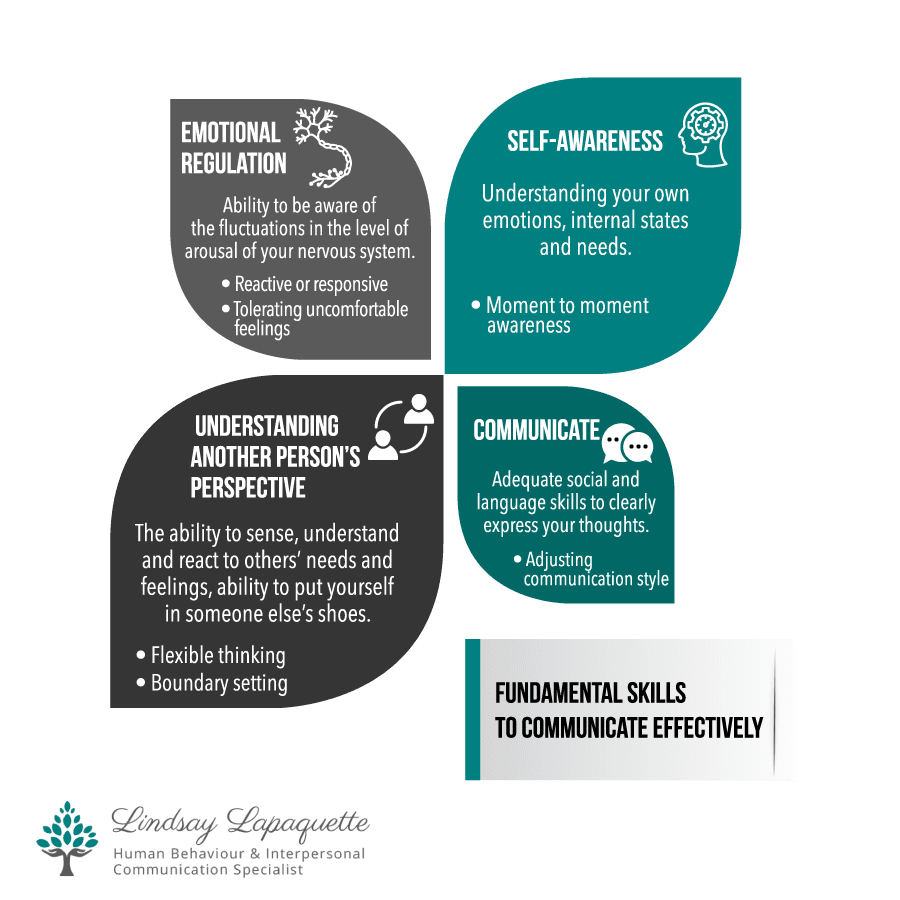Almost everyone thinks that they communicate effectively. However, the foundational skills for effective communication are much more complex than simply being able to understand others and express yourself clearly.

Being able to listen and communicate our ideas in a way that will engage others and encourage them to open up and want to work with us, rather than reflexively push against our ideas is complex.
For example, if you’re trying to convince someone to agree with an idea you have had, you may need to use a different approach with one personality than you would another.
Consequently, in order to be able to truly communicate effectively with all different personalities, we need to have mastered the complex underlying foundational skills to communication that allow us to deliver our message effectively to all different types of people. These skills relate more to how you share your message than to what your actual message is.
Understanding these underlying skills can help you identify where weaknesses – whether your own, or those of fellow team members – can lead interactions to go awry.
After more than 15 years in the field of interpersonal communication, digging deep with clients to unveil the true root causes of communication challenges that cause stress to individuals and teams, I have concluded that in order to sustainably improve communication skills, we must focus on improving the following foundational skills:

1. Self-awareness:
Understanding your own emotions, internal states and needs.
- Moment to moment awareness of how you are feeling while in an interaction so to ensure that your emotions get addressed.
- Helps you to set boundaries around what is and IS NOT acceptable to you.
- Understanding of your own personality style and needs helps you to know how much compromise you can tolerate without sacrificing your own needs.
- Ability to note when you are reacting, instead of responding to a situation.
2. Understanding another person’s perspective:
The ability to sense, understand and react to others’ needs and feelings, ability to put yourself in someone else’s shoes.
- Enables you to attempt to truly understand a perspective that is different from your own and be potentially open to compromises that may meet both people’s needs.
- Basis for empathy and collaboration.
- Ability to maintain your own boundaries with compassion.
3. Emotional regulation:
Ability to notice and adaptively manage fluctuations in the level of arousal of your nervous system from a
- Ability to effectively tolerate uncomfortable feelings, rather than having these feelings control your reactions.
- Awareness of when you are reacting instinctively and the ability to use strategies to return to a calm, receptive state.
4. Communicating your needs effectively:
Adequate social and language skills to clearly express your thoughts.
- Expressing and elaborating your thoughts and ideas in a clear manner.
- Ability to adapt your communication style to different personality styles.
- Being willing to say what needs to be said, even if you are scared.
If you are ready to start sustainably improving communication dynamics within your workplace, you can learn more about my corporate workshops here.
If you liked this post, you might also like:
7 Signs That Your Team Has a Communication Problem



